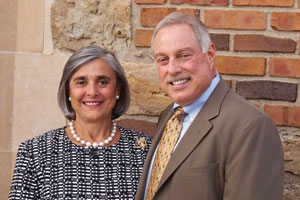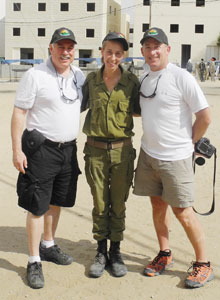 Google Todd Stettner and you won’t find much. Yes, you can find statements attributed to him as executive vice president and CEO of the Jewish Federation of Greater Kansas City. But you won’t find stories written about him. That’s because he does his job well, leading the way for others to take credit for his successes.
Google Todd Stettner and you won’t find much. Yes, you can find statements attributed to him as executive vice president and CEO of the Jewish Federation of Greater Kansas City. But you won’t find stories written about him. That’s because he does his job well, leading the way for others to take credit for his successes.
His leadership style is one reason Stettner is being honored at Congregation Beth Israel Abraham & Voliner’s 14th annual Purim Gala, Sunday, Feb. 12, at Oakwood Country Club. He will receive the Mordechai Award, which is presented to someone who epitomizes the devotion to the Jewish community or Israel as shown by Mordechai in the Scroll of Esther, which says that Mordechai “...sought the good of his people and was concerned for the welfare of all …”
Jewish Federation President Miriam Scharf can’t think of a more deserving recipient than Stettner.
“As the CEO of the Kansas City Jewish Federation, Todd has been instrumental in creating a collaborative, open and engaging environment in the Jewish community. He has earned the respect and admiration of lay leaders, staff and his colleagues around the country,” Scharf said.
Stettner’s friendly leadership style is easily noticed when you first enter his office. One can’t miss the candy jars on his conference table, put there as an open invitation for people to stop in for an informal chat.
“I started doing that when I became the COO of the East Bay Federation in Oakland. The lay people loved it. I thought it would be a good way to get my staff to come in my office because they don’t want to come in and see the boss. That way I could informally find out what’s going on,” he explained.
It worked and he continued the practice when he came here as Kansas City’s top Jewish Federation’s official in 1999.
“People come in with their children and their grandchildren,” he said.
The road to KC A native of The Bronx, N.Y., Stettner, who now has more than 33 years of experience in the social service field under his belt, didn’t always know he was going to spend a lifetime in the field of Jewish communal service. But he’s always liked being involved in organizations in high school and college. He served as president of his high school chapter of the National Conference of Christians and Jews and among other things was on the Intra Fraternity Council while he was an undergrad at Marrietta College in Marietta, Ohio. College was where he first really discovered his Jewishness.
A native of The Bronx, N.Y., Stettner, who now has more than 33 years of experience in the social service field under his belt, didn’t always know he was going to spend a lifetime in the field of Jewish communal service. But he’s always liked being involved in organizations in high school and college. He served as president of his high school chapter of the National Conference of Christians and Jews and among other things was on the Intra Fraternity Council while he was an undergrad at Marrietta College in Marietta, Ohio. College was where he first really discovered his Jewishness.
“In New York it’s easy to be a Jew. Even though Jews are still a minority … Jewish culture is so much a part of the culture of New York. Because of that I sought out my Judaism more and started taking religion courses,” he said.
His first taste of Jewish communal work came just after graduation in 1971. He worked as a temporary fundraising assistant at Federation of Jewish Philanthropies in New York.
They liked him and wanted to keep him full-time, but instead he chose to go to grad school at the Wurzweiler School of Social Work of Yeshiva University. He graduated with a master’s degree in social work, with an emphasis in the field of community organization, in 1974.
His first full-time job was at the Milwaukee Jewish Federation. During the two years he was there, he met his future wife, Shirley. They now have two grown sons. Jordan and his wife, Ali, live in Chicago. Youngest son Max lives and works in New York City.
Todd Stettner has worked either with Jewish federations or community centers his entire professional career. Besides Milwaukee and New York, he’s worked in the San Francisco Bay area, Tucson, Ariz., and Seattle.
While Stettner was in California, national federation officials decided it would be a good idea to train high-level executives to become CEOs. A management program was created and Stettner was invited to participate in the first two-year-program. Part of the program included an internship, which he served in the East Bay Federation in California. As had become a pattern, the leadership liked Stettner and asked him to stay on. This time he would become the first person in that size federation to hold the title of chief operating officer.
“They offered me the job ahead of schedule. I just really hit it off with them and I did that for five years,” Stettner said.
Ready to be CEO
After five years as COO of East Bay, Stettner was ready for his own federation. He interviewed here for the position being vacated by A. Robert Gast. Kansas City appeared to be a good fit for Stettner, and it’s been his home for almost 13 years now. That’s longer than any other place he’s ever been.
“They say some things are beshert (meant to be). ... The strategic plan had just been approved in 1998 and they were looking for someone to implement it. When I read it, a lot of the ideas were very similar to what we’d been doing in California,” he recalled. “I was interviewing at another community and they said we don’t want you to go to that other community. You’re our guy.”
Stettner likes being in Kansas City and is proud he was able to bring the strategic plan “from paper to reality.”
“You can get your arms around a community like this. You can feel that you are making an impact. In the big city … it was hard to make a difference. It was hard to really make change. It is much easier to make change in a community like Kansas City. The impact is much stronger. I like being at a place in my job where I could make an impact.
Stettner doesn’t use the term collaboration when he discusses the Jewish Federation’s accomplishments over the last several years. But he’s been a part of a lot of collaborative efforts that have made a big impact. One of those efforts is The Funders Council, which was created by Stan Bushman and the late John Uhlmann.
“It started as a very loose get together with the Jewish Community Foundation, the Jewish Heritage Foundation and Federation. I said to Merilyn (Berenbom, former Federation president) this is really an incredible thing that we should be doing on a more regular basis. So we started to meet quarterly and then as we got to know each other better, trust began to build and it has grown so now we meet almost monthly,” he said.
“It’s really unique in the entire federation system. There is really no other community that I am aware where the foundations and the federations work together like we do,” he said.
His collaborative manner also helped keep the Jewish Community Campus “whole” when the Lewis and Shirley White Theatre was being built.
“There was a lot of tumult that came with the building of the theater,” he said, explaining that some of the agencies strongly considered moving out of the Campus at that time. “This was when Pella Fingersh was president and we really worked very hard to keep the Campus whole and I think that’s been very important for the community.”
It would be remiss not to mention the Jewish Federation’s continued fundraising success under Stettner’s leadership. While it’s been hard for Jewish Federations nationally to raise more dollars due to the downward economy, Stettner said Kansas City has been able to grow the Annual Campaign as well as supplemental giving.
“Everything has shrunk a little during the recession. But over the years we’ve been involved in a number of emergency campaigns — the intifadas, the Israel emergency campaigns, the Lebanese war — all of which Kansas City has done a fabulous job raising funds,” he said.
Stettner is honored to be BIAV’s choice for this year’s Mordechai Award.
“Because we have BIAV, there are many people who come to this community who wouldn’t come otherwise. I think that adds to the richness of the fabric of the community,” Stettner said.
“We don’t have a very large Orthodox community in Kansas City. In some places the Orthodox community goes their own way and doesn’t really integrate with the rest of the community. That’s not the case here and to a large extent that’s been because of its leadership — both rabbinic and lay,” he continued. “I have been a participant in the Purim Gala for a while and sometimes they’ve come to me for suggestions as to who the honoree should be. So I was very flattered when they came to be and asked me to be the honoree. I think they are an important part of the community and I think they give a lot back to the community, far more than their numbers dictate.”


